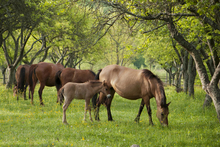âHorses are designed to be continuous grazers,â explains nutrition expert Don Kapper. An 1100 pound horse will eat up to 18 hours a day consuming 2.0% - 2.5 % of their body weight per day in dry forage.

Grazing - Your horse's favorite pastime
Soft hay is more desirable for the performance horse because its nutrients will be higher and is easier to digest and forage should make up 50% to 90% of a mature horses total diet.
Hay and your horse
- Forage should make up 50% to 90% of a mature horses total diet. Knowing the nutrients of your forage is important before deciding what the horse may need in the way of concentrates and/or supplements.
- Horses only produce saliva when they chew and saliva acts as a natural buffer for the digestive system reducing chances of acid gut syndrome, ulcers and impaction colic
- The hind gut of the horse makes up 62% of their digestive system, which functions with a microbial population breaking down the fibre in forages by fermentation.
- Soft hay is more desirable for the performance horse because its nutrients will be higher and is easier to digest. Over mature hay is cut later, will have grown taller and have larger, courser stems. This hay will be higher in lignin, which makes it less palatable and lower in digestibility, i.e. quality.
Body Condition Score
Checking the horses Body Condition Score on a monthly basis provides a good visual indicator for achieving optimal calorie intake with the ideal being between five and six on a scale of one to nine. Performance loss will occur before you see visual changes that may indicate an unbalanced diet. Visual changes to watch out for include:
- Loss of muscle over topline
- Decline in hoof and hair quality.
- Loss of appetite and unthrifty condition
Amino Acids
During the process of conditioning horses, muscles are torn down during exercise and need additional branch-chain amino acids.
- A horse can benefit greatly from having 4 â 10 ounces of branch-chain amino acids replaced within 45 minutes of a workout.
- Research has shown a lack of amino acids in the diet can affect the utilization of minerals in the diet, potentially causing skeletal and soft tissue problems.
- All 10 essential amino acids need to be provided to horses on a daily basis: arginine, histidine, isoleucine, leucine, lysine (involved in growth and development), methionine (for hoof and hair quality), phenylalanine, threonine (involved in tissue repair), tryptophan, and valine.
- If one amino acid runs out, it âlimitsâ protein synthesis for the rest of the amino acids.
- For grass hay, your first limiting amino acid is going to be Lysine. For alfalfa, it could be threonine or tryptophan. Knowing what âtype of forageâ you are feeding is key to knowing what supplements you need to choose to complement your horseâs diet.
Feed According to Directions
Always choose a feed that is tailored to the individual needs of the horse (size, breed, age, workloadâ¦) and feed according to the instructions. Kapper cautions, âFeeding less than recommended amounts/day, means you have chosen the wrong feed and it could result in nutritional deficienciesâ.
If you would like to learn more, including choosing calorie sources to fuel muscle function and the role of electrolytes and assessing topline, please read Equine Guelphâs article âNutrition Replacement for Optimum Performanceâ. Always contact a trusted equine professional or veterinarian if you are concerned about your horseâs diet or health. Equine Guelph offers 12-week online courses in Equine Nutrition and Advanced Equine Health through Nutrition.
Bio: Don Kapper is a highly experienced equine nutritionist. Don graduated from Ohio State University and achieved his credentials as a Professional Animal Scientist from the American Registry of Professional Animal Scientists in 1996 and has been a sought-after speaker for equine meetings in both the U.S. and Canada. He was a member of the âPerformance Electrolyte Researchâ team at the University of Guelph and wrote the chapter on âApplied Nutritionâ for the authoritative veterinary textbook: âEquine Internal Medicineâ, 2nd edition.
Don also co-developed the âEquine Nutritionâ course for the Equine Science Certificate program for Equine Guelph and has been a popular guest speaker in several Equine Guelph online courses, including the Equine Growth and Development, Exercise Physiology and Advanced Equine Nutrition.
Learn more about online courses for horse caregivers at the Equine Guelph education web page.
About Equine Guelph
Equine Guelph is the horse ownersâ and care giversâ Centre at the University of Guelph. It is a unique partnership dedicated to the health and well-being of horses, supported and overseen by equine industry groups. Equine Guelph is the epicentre for academia, industry and government â for the good of the equine industry as a whole. For further information, visit www.EquineGuelph.ca.
